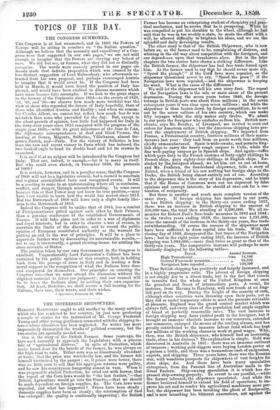TOPICS OF THE DAY.
THE CONGRESS SUMMONED.
THE Congress is at last summoned, and in 1860 the Powers of Europe will be sitting in conclave on "the Italian question." Although we believe that the necessity and expediency of a Con- gress were first suggested in our own pages,• we are not wild enough to imagine that the Powers are obeying any behest of ours. We did but see, or foresee, what they aid not so distinctly recognize. The words were scarcely printed in our pages ere Russia made that definite proposition which was crossed by the less distinct suggestion of Lord Malmeebury, wbo afterwards re- tracted from his own proposal, and perhaps encouraged Austria to imagine that it would never be. If the Congress had been held in March, it would have found the position of Italy less altered, and would have been enabled to discuss measures which have since become faith accomplis. If we look to the great stages in the history of the Peninsula since 1815—to the events of 1820, '31, '48, and '56—we observe how much more truthful was the view of those who regarded the future of Italy hopefully, than of those who identified Austria and finality ; and when we remem- ber Charles Albert, we cannot but reflect how much less he was mistaken than some who prevailed for the day. But, except in the silent growth of opinion, how little had happened for Italy in the forty-four years since 1815 compared with the progress of the single year 1859,—with its great milestones of the Jour de l'An, the diplomatic correspondences at deaf and blind Vienna, the landing at Genoa, Magenta, Solferino, Villafranca, almost for- gotten Zurich, and—Paris. For the victory of Solferino is less than the new and recent victory in Paris which has induced the two-beaked eagle to bend its double head and let its crowns be examined.
It is safd that no subject will be introduced to the Congress but Italy. That one, indeed, is enough,—for it is many in itself. But who could even sketch, in December 1859, the protocols of 1860 ?
It is certain, however, and in a peculiar sense, that the Congress of 1860 will not be a legislative council, but a council to ascertain and register accomplished facts and recognized events. It will be a meeting to come to an understanding where all is confusion, conflict, and danger, through misunderstanding. In some cases because this or that Power may not know its true position,—may have been unable to learn how the world has moved since 1815. But the Metternich of 1860 will have only a slight family like- ness to the Metternich of 1815.
Indeed the Congress will be unlike that of 1815, less a combat of Plenipotentiaries pitted against each other by their Princes, than a genuine conference of the established Governments of Europe. It will take place not in order to a war of diplomats and royal interests, but in order to observe a war of events, to ascertain the limits of the disorder, and to record the public opinion of European constituted authority as the warrant for putting an end to the war of principles. It will be a place to supersede further war by discounting its ascertainable results,— not to say it irreverently, a grand clearing-house for settling the cross accounts of States.
The position taken by our own Government in the Congress is excellent. Unquestionably Lord Palmerston's Cabinet has been sustained by the public opinion of this country, both in holding back from the passage of arms in Italy and in lending a firm moral support to the recognition of what the Italians have done and conquered for themselves. Our principles on entering the Congress are—that we must attend the discussion without the slightest restraint to fetter our judgment ; and our counsel will be to leave the Italians alone in settling their own organiza- tion. At least, therefore, we shall secure a full hearing for the Italians, their case, their wants, and their wishes.
• Spectator, February 26, 1859.


























 Previous page
Previous page